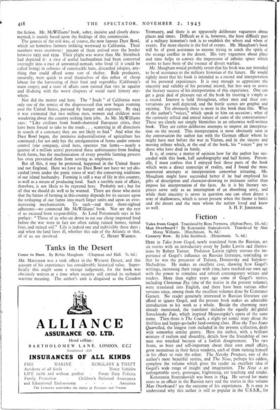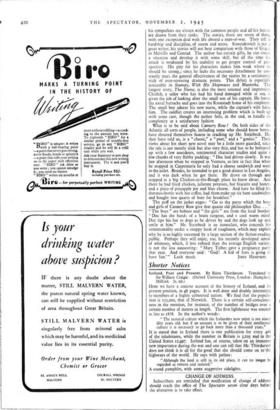Fiction -
Cannery Row. By John Steinbeck. (Heinemann. 7s. 6d.)
HERE in Tales from Gogol, newly translated from the Russian, are six stories with an introductory essay by Janko Lavrin mad illustra- tions by Robert Turner. Professor Lavrin rightly stresses the im- portance of Gogol's influence on Russian literature, reminding us that he was the precursor of Tolstoy, Dostoevsky and Saltykov- Shchedrine. He makes an excellent case, showing how Gogol's writings, increasing their range with time, have reached our own age with the power to stimulate and refresh contemporary writers and readers. More then eighty years ago some of Gogol's stories, including Christmas Eve (one of the stories in the present volume), were translated into English, and there have been various other versions since, among them the excellent volumes done by Constance Garnett. No reader genuinely interested in Russian literature can afford to ignore Gogol, and the present book makes an admirable introduction to his work as a whole. Beside the charming story already mentioned, the translator includes the equally derghtful Sorochinsky Fair, which inspired Moussorgsky's opera of the same name. Then there is The Coach, a slight yet comic story about the thriftless and happy-go-lucky land-owning class. How the Two Ivans Quarrelled, the longest item included in the present collection, deals with somewhat similar gentry. Here the author, with a brilliant mixture of realism and absurdity, details how the friendship of two men was wrecked because of a foolish disagreement. The two Ivans, so busy and self-important about their own small affairs, grow monstrous in their fierce vendetta, each of them ruining himself in his effort to ruin the other. The Nevsky Prospect, one of the author's most beautiful stories, and The Nose, perhaps his oddest, complete the volume which gives the reader an excellent idea of Gogol's wide range of insight and imagination. The Nose Is an unforgettable story, grotesque, frightening, yet touching and tender.
Konstantin Stanyukovich was born in 1844. He served for many years as an officer in the Russian navy and the stories in this volume Man Overboard ! are the outcome of his experiences. It is easy to understand why this author is still so popular in the U.S.S.R., for his sympathies are always with the common people and all his herces are drawn from their ranks. The stories, there are seven of them, with one exception deal with life aboard a man-of-war. They tell or hardship and discipline, of storm and stress. Stanyukovich is not a great writer, his stories will not bear comparison with those of Gcgol, or Melville and Conrad. The author has certain gifts, he can create a situation and develop it with some skill, but all the time his attack is weakened by his inability to get proper control of per- spective. His pity for his characters makes him weak where he should be strong.; since, he lacks the necessary detachment he con- stantly mars the general effectiveness of the stories by a sentimental trick of over-stressing dramatic points. This defect is especially noticeable in Stumpy, With His Shipmates and Maximka. The longest story, The Nurse, is also the most unusual and impressive. Chizhik, a sailor who has had his hand damaged while at sea, is given the job of looking after the small son of his captain. He leaves the naval barracks and goes into the Kronstadt home of his employer. The small boy adores his new nurse, while the captain's wife hates him. The conflict creates an interesting problem which is built up with some care, though the author fails, in the end, to handle its complexity in a satisfactory fashion What is to be said about Cannery Row? On both sides of the Atlantic all sorts of people, including some who should know better. have shouted themselves hoarse in cracking up Mr. Steinbeck. He, they have told us, is a "classic," a " poet," and a " genius." Their views about his short new novel may be a little more guarded, since the tale is not merely slick but also very thin, and has to be bolstered up with a few anecdotes, sentimental character studies and quite a few chunks of very flabby padding : " Doc had driven slowly. It was late afternoon when he stopped in Ventura, so late in fact that when he stopped in Carpentaria he only had a cheese sandwich and went to the toilet. Besides, he intended to get a good dinner in Los Angeles, and it was dark when he got there. He drove on through and stopped at a big Chicken-in-the-Rough place he knew about. And there he had fried chicken, julienne potatoes, hot biscuits and honey. and a piece of pineapple pie and blue cheese. And here he filled his thermos-bottle with hot coffee, had them make up six ham sandwiches and bought two quarts of beer for breakfast."
The puff on the jacket urges: " Go to the party which the boys and girls of Cannery Row give that quaint old philosopher Dec. . . ." " The boys " are hoboes and " the girls " are from the local brothel. " Doc has the handa of a brain surgeon, and a cool warm mind. Doc tips his hat to dogs as he drives by and the dogs look up and smile at him." Mr. Steinbeck is an iconoclast, who conceals hi/ sentimentality under a snappy husk of toughness, which may explain why he is so highly esteemed by a large section of the fiction-reading public. Perhaps they will enjoy, too, his recently developed streak of whimsey, which, if less refined than the average English variety. is not the less nauseating: "Mary Talbot gave a pregnancy party that year. And everyone said : ' God! A kid of hers is going to































 Previous page
Previous page